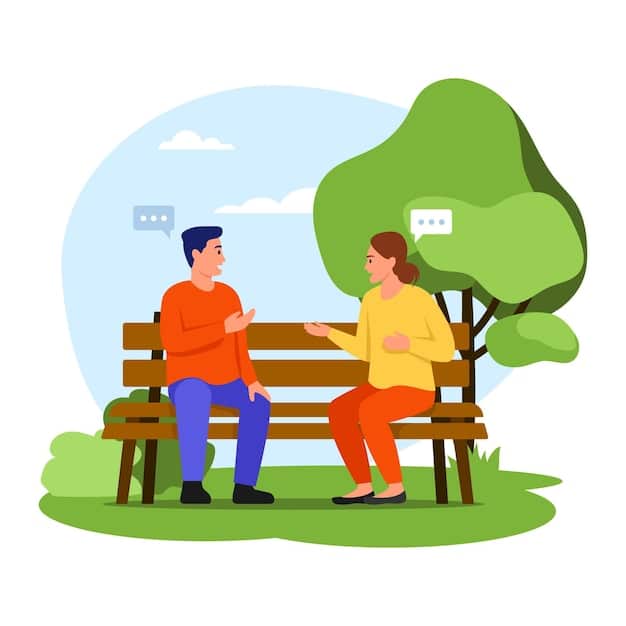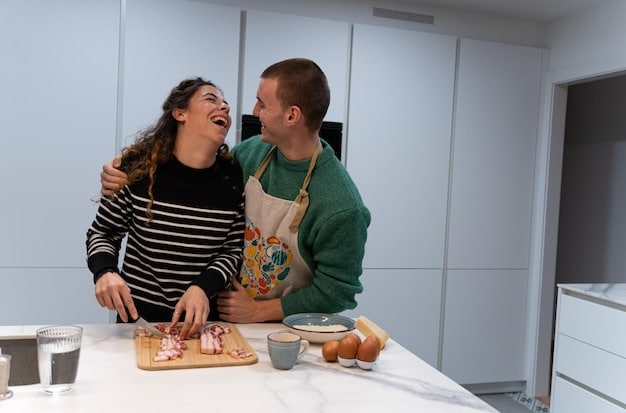Cultivate Meaningful Relationships: Improve Communication & Strengthen Bonds

Cultivating meaningful relationships involves improving communication skills, understanding different perspectives, and investing time and effort to strengthen bonds, fostering deeper and more fulfilling connections.
In today’s fast-paced world, nurturing deep connections can often take a backseat. However, the ability to cultivate meaningful relationships: strategies to improve communication and strengthen bonds is crucial for personal well-being, happiness, and overall life satisfaction. This article will explore practical tips and strategies for building and maintaining strong, fulfilling relationships.
Why Meaningful Relationships Matter
Meaningful relationships are the bedrock of a happy and fulfilling life. They provide us with a sense of belonging, support, and purpose. Without them, we can feel isolated and lonely. But what exactly makes a relationship “meaningful”?
A meaningful relationship is one where there is mutual respect, trust, and affection. It is a relationship where you feel comfortable being yourself, sharing your thoughts and feelings without fear of judgment. These relationships are not always easy, but they are worth investing in because of the profound impact they have on our lives.
Benefits of Strong Relationships
There are countless benefits to cultivating strong relationships. Here are just a few:
- Improved Mental Health: Strong relationships can buffer against stress, anxiety, and depression.
- Increased Longevity: Studies show that people with strong social connections tend to live longer.
- Enhanced Physical Health: Meaningful relationships can boost your immune system and lower your risk of chronic diseases.
- Greater Happiness: Sharing your life with people you care about can bring immense joy and satisfaction.
In essence, meaningful relationships are an investment in your well-being. They provide a safety net during difficult times and a source of joy and support during good times.

Understanding the Foundations of Meaningful Relationships
Before delving into strategies, it’s important to understand the foundational elements that make relationships thrive. These elements are like the pillars that hold up a strong and lasting structure.
Key ingredients in building or reigniting the flame of meaningful relationships include effective communication, empathy, trust, and shared values. These elements work together to create a sense of connection, understanding, and mutual respect.
Communication: The Lifeblood of Connection
Communication is about more than just exchanging words. It involves active listening, clear expression, and the ability to understand and respond to others’ emotions. Effective communication is the cornerstone of any healthy relationship.
When communication breaks down, misunderstandings arise, leading to conflict and disconnection. It is crucial to learn how to communicate openly and honestly, even when it’s difficult.
Empathy: Walking in Someone Else’s Shoes
Empathy is the ability to understand and share the feelings of another person. It involves putting yourself in their shoes and seeing the world from their perspective. Empathy builds bridges between people and fosters a sense of connection and understanding.
Without empathy, it’s difficult to truly connect with others on a deep level. Empathy allows us to be supportive, compassionate, and understanding, even when we don’t agree with someone’s actions or beliefs.
Meaningful relationships are built on a foundation of mutual understanding and shared emotional experiences, reinforcing their importance in our lives.
Improving Your Communication Skills
Effective communication is a skill that can be learned and improved upon. It requires conscious effort and a willingness to practice new techniques. Here are some strategies for enhancing your communication skills:
By mastering the art of active listening, expressing yourself clearly, and managing conflicts constructively, you can significantly improve your relationships. These skills will help you build stronger connections and navigate challenges more effectively.
Active Listening: Tuning In to What Others Are Saying
Active listening involves paying attention to what the other person is saying, both verbally and nonverbally. It means putting aside your own thoughts and judgments and focusing solely on understanding their perspective. Here are some specific techniques:
- Maintain Eye Contact: This shows that you are engaged and interested in what they are saying.
- Nod and Use Verbal Affirmations: This lets them know you are following along.
- Ask Clarifying Questions: This ensures you understand their message correctly.
- Summarize and Reflect: This confirms your understanding and shows empathy.
Expressing Yourself Clearly and Assertively
Clear and assertive communication is essential for ensuring your needs and feelings are understood. It involves expressing yourself honestly and respectfully, without being aggressive or passive. Here are some tips:
- Use “I” Statements: Express your feelings and needs from your own perspective.
- Be Specific and Concrete: Avoid vague or general statements.
- Stay Calm and Respectful: Even when discussing difficult topics, maintain a calm and respectful tone.
Practicing these communication skills will not only improve your relationships but also boost your self-confidence and ability to navigate challenging situations.
Strengthening Bonds Through Shared Experiences
Shared experiences create memories and strengthen the bonds of a relationship. These experiences can be anything from going on vacation together to simply sharing a meal or engaging in a hobby.
The key is to find activities that you both enjoy and that allow you to connect on a deeper level. Shared experiences create a sense of shared history and contribute to the overall richness and depth of the relationship.

Creating Meaningful Shared Moments
While grand gestures are appreciated, its often the small, everyday moments that truly make a difference. These moments can be as simple as:
- Having a Conversation: Taking the time to talk and listen to each other without distractions.
- Sharing a Meal: Enjoying a meal together and engaging in pleasant conversation.
- Going for a Walk: Taking a walk in nature and appreciating the beauty around you.
By creating a habit of sharing these small but meaningful moments, you can deepen your connection and create a sense of intimacy.
Exploring New Activities Together
Trying new things together can be a fun and exciting way to strengthen your bond. It exposes you to new challenges and opportunities for growth, both individually and as a couple. Consider these options:
- Taking a Class: Learning a new skill together, such as cooking, dancing, or painting.
- Traveling to a New Place: Exploring a new culture and creating lasting memories.
- Volunteering for a Cause: Giving back to the community and making a difference together.
These shared adventures create opportunities for laughter, support, and bonding, contributing to the overall strength of the relationship.
Engaging in shared activities not only strengthens relationships but also enriches individual lives, creating a synergistic effect of growth and connection.
Overcoming Challenges and Resolving Conflicts
No relationship is perfect. Every relationship will face challenges and conflicts at some point. The key is to learn how to navigate these challenges constructively and use them as opportunities for growth.
By addressing conflicts with open communication, empathy, and a willingness to compromise, you can strengthen your relationship and come out stronger on the other side.
Developing Healthy Conflict Resolution Strategies
Conflict is inevitable, but it doesn’t have to be destructive. Here are some strategies for resolving conflicts in a healthy way:
- Stay Calm: Avoid raising your voice or becoming defensive.
- Listen Actively: Try to understand the other person’s perspective.
- Find Common Ground: Look for areas of agreement and build from there.
- Compromise: Be willing to meet the other person halfway.
Seeking Professional Help When Needed
Sometimes, despite your best efforts, conflicts can become too difficult to resolve on your own. In these cases, seeking professional help from a therapist or counselor can be beneficial. A therapist can provide you with tools and strategies for improving communication, resolving conflicts, and strengthening your relationship.
Seeking help is a sign of strength, not weakness. It shows that you are committed to the relationship and willing to do what it takes to make it work.
Overcoming obstacles together, navigating disagreements respectfully, and seeking support when needed can transform relationships into resilient and enduring connections.
Maintaining Meaningful Relationships Over Time
Once you’ve built meaningful relationships, it’s important to maintain them over time. This requires ongoing effort and attention. Relationships are like plants; they need to be nurtured and cared for in order to thrive.
Making a conscious effort to prioritize your relationships, stay connected, and show appreciation can help you maintain strong and fulfilling bonds for years to come.
Prioritizing Quality Time
In today’s busy world, it’s easy to let relationships fall by the wayside. Make a conscious effort to prioritize quality time with the people who matter most to you.
- Schedule Regular Dates: Plan regular outings or activities together.
- Disconnect from Technology: Put away your phones and other devices when you’re spending time together.
- Be Present: Focus on being fully present and engaged in the moment.
Showing Appreciation and Gratitude
Expressing appreciation and gratitude is a powerful way to strengthen your relationships. It lets the other person know that you value them and their presence in your life.
- Say Thank You: Express your gratitude for the things they do for you.
- Give Compliments: Acknowledge their qualities and accomplishments.
- Write a Note: Send a heartfelt note expressing your appreciation.
Consistently nurturing relationships through dedicated time and expressions of gratitude ensures their longevity and continued enrichment.
| Key Point | Brief Description |
|---|---|
| 🗣️ Active Listening | Focus on understanding others by paying attention to their words and non-verbal cues. |
| 🤝 Empathy | Understand and share the feelings of others to build stronger connections. |
| 🎉 Shared Experiences | Create lasting memories by engaging in activities together. |
| 🕰️ Prioritize Time | Make a conscious effort to allocate time for quality interactions. |
Frequently Asked Questions
▼
Practice active listening by paying attention to body language, asking clarifying questions, and summarizing to ensure understanding. Express yourself clearly using “I” statements to convey your feelings without blaming.
▼
Empathy is crucial as it allows you to understand and share others’ feelings, fostering deeper connection. It helps in providing support and understanding, even when you don’t necessarily agree with their viewpoint.
▼
Shared experiences create lasting memories and strengthen bonds. Engage in regular activities, whether small or grand, to build shared history and increase connection through laughter, adventure, or simple companionship.
▼
Stay calm during disagreements, listen actively without interrupting, and seek common ground. Be open to compromise to find solutions that meet both parties’ needs, turning potential conflicts into growth opportunities.
▼
Prioritize quality time by scheduling regular interactions and being fully present. Show appreciation through kind words, gestures, and acknowledgments of the other person’s value to continually nurture and cherish the connection.
Conclusion
Cultivating meaningful relationships: strategies to improve communication and strengthen bonds, requires effort, vulnerability, and a willingness to invest in others. By improving your communication skills, practicing empathy, sharing experiences, and resolving conflicts constructively, you can build and maintain strong, fulfilling relationships that enrich your life and the lives of those around you.





